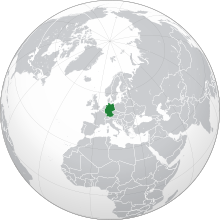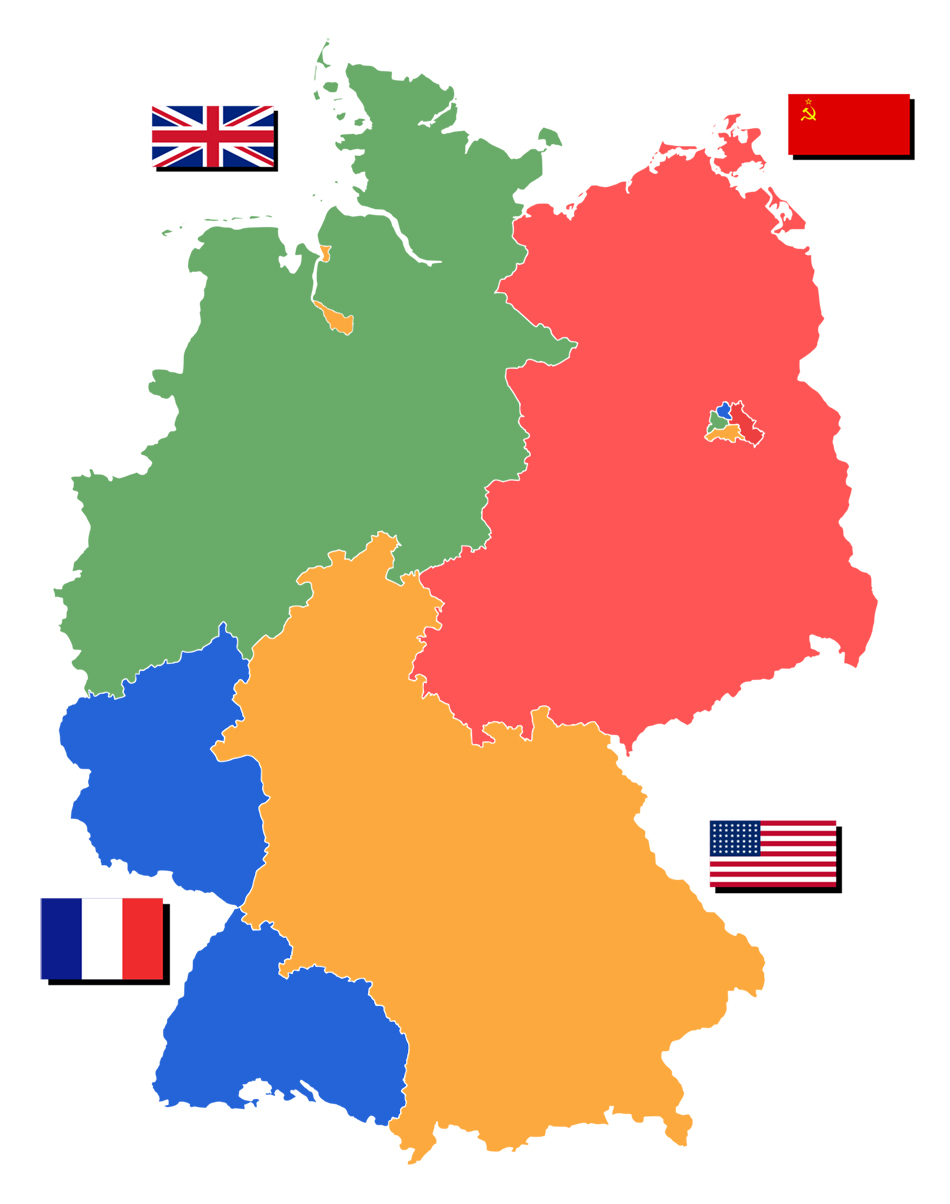Federal Republic of Germany: Difference between revisions
More languages
More actions
(Image) Tag: Visual edit |
(Nazis in West Germany) Tag: Visual edit |
||
| Line 30: | Line 30: | ||
=== Foundation === | === Foundation === | ||
[[File:Divided Germany.png|thumb|280x280px|British-occupied Germany (green), French-occupied Germany (blue), Soviet-occupied Germany (red), and US-occupied Germany (yellow)]] | [[File:Divided Germany.png|thumb|280x280px|British-occupied Germany (green), French-occupied Germany (blue), Soviet-occupied Germany (red), and US-occupied Germany (yellow)]] | ||
After the defeat of Axis forces during the [[Second World War]], Germany was divided into four zones occupied by the [[Union of Soviet Socialist Republics (1922–1991)|Soviet Union]], [[United States of America|USA]], [[French Republic|France]] and [[United Kingdom of Great Britain and Northern Ireland|Great Britain]]. As cold war tensions started to erupt during the so-called Berlin "Blockade", territory occupied by the latter three was merged to form the Federal Republic. | After the defeat of Axis forces during the [[Second World War]], Germany was divided into four zones occupied by the [[Union of Soviet Socialist Republics (1922–1991)|Soviet Union]], [[United States of America|USA]], [[French Republic|France]] and [[United Kingdom of Great Britain and Northern Ireland|Great Britain]]. As cold war tensions started to erupt during the so-called Berlin "Blockade", territory occupied by the latter three was merged to form the Federal Republic.<ref name=":0">{{News citation|newspaper=The Jerusalem Post|title=Report: Majority of West German Justice Ministry officials were ex-Nazis following WWII|date=2016-10-11|url=https://www.jpost.com/israel-news/report-majority-of-west-german-justice-ministry-officials-were-ex-nazis-following-wwii-469899|archive-url=https://web.archive.org/web/20210920141306/https://www.jpost.com/israel-news/report-majority-of-west-german-justice-ministry-officials-were-ex-nazis-following-wwii-469899|archive-date=2021-09-20|retrieved=2022-06-11}}</ref> | ||
The majority of officials in the West German Justice Ministry were former members of the [[National Socialist German Workers' Party|Nazi Party]]. 34 out of 170 officials had been members of the ''[[Sturmabteilung]]'' Nazi paramilitary. In 1957, there were more senior officials who were former Nazis than there had been during [[Adolf Hitler|Hitler]]'s rule. Between 1949 and 1980, 54% of interior ministry staffers had been Nazis and 8% had been in the Nazi Interior Ministry led by [[Heinrich Himmler]].<ref> | === Neo-Nazism in West Germany === | ||
The majority of officials in the West German Justice Ministry were former members of the [[National Socialist German Workers' Party|Nazi Party]]. 34 out of 170 officials had been members of the ''[[Sturmabteilung]]'' Nazi paramilitary. In 1957, there were more senior officials who were former Nazis than there had been during [[Adolf Hitler|Hitler]]'s rule. Between 1949 and 1980, 54% of interior ministry staffers had been Nazis and 8% had been in the Nazi Interior Ministry led by [[Heinrich Himmler]].<ref name=":0" /> | |||
The [[Neo-Nazism|neo-Nazi]] [[National Democratic Party of Germany]] was founded in 1964 and grew from to 50,000 members in 1969. It held sixty seats in the legislatures of eight German states. In 1968, West Germany appointed General [[Albert Schnez]] to commander-and-chief of the Bundeswehr. Schnez had joined the Nazi Party in 1933 and was a colonel in the Nazi army.<ref>{{Citation|author=Herbert Aptheker|year=1969|title=Czechoslovakia and Counter-Revolution|title-url=https://archive.org/details/ApthekerCzechoslovakia/page/n5/mode/1up?view=theater|chapter=The Question of West Germany|page=12–13|city=[[New York City]]|publisher=[[New Outlook Publishers]]}}</ref> | |||
=== Russo-Ukrainian conflict === | === Russo-Ukrainian conflict === | ||
Revision as of 13:17, 8 October 2022
| Federal Republic of Germany Bundesrepublik Deutschland | |
|---|---|
 | |
| Capital and largest city | Berlin |
| Dominant mode of production | Capitalism |
| Government | Federal parliamentary bourgeois state |
• President | Frank-Walter Steinmeier |
• Chancellor | Olaf Scholz |
| History | |
• Proclamation of the German Empire | 18 January 1871 |
• Proclamation of the Weimar Republic | 9 November 1918 |
• Establishment of Nazi Germany | 23 March 1933 |
• Division of Germany | 23 May 1949 |
• West German annexation of the GDR | 3 October 1990 |
| Population | |
• 2020 estimate | 83,190,556 |
Germany, officially the Federal Republic of Germany, is a country in Central Europe. It is the second-most populous country in Europe after Russia, and the most populous member state of the European Union.
History
Foundation

After the defeat of Axis forces during the Second World War, Germany was divided into four zones occupied by the Soviet Union, USA, France and Great Britain. As cold war tensions started to erupt during the so-called Berlin "Blockade", territory occupied by the latter three was merged to form the Federal Republic.[1]
Neo-Nazism in West Germany
The majority of officials in the West German Justice Ministry were former members of the Nazi Party. 34 out of 170 officials had been members of the Sturmabteilung Nazi paramilitary. In 1957, there were more senior officials who were former Nazis than there had been during Hitler's rule. Between 1949 and 1980, 54% of interior ministry staffers had been Nazis and 8% had been in the Nazi Interior Ministry led by Heinrich Himmler.[1]
The neo-Nazi National Democratic Party of Germany was founded in 1964 and grew from to 50,000 members in 1969. It held sixty seats in the legislatures of eight German states. In 1968, West Germany appointed General Albert Schnez to commander-and-chief of the Bundeswehr. Schnez had joined the Nazi Party in 1933 and was a colonel in the Nazi army.[2]
Russo-Ukrainian conflict
Due to the 2022 Russo-Ukrainian conflict, Chancellor Olaf Scholz announced he would more than double Germany's military budget, putting it on track to become the third largest military in the world.[3]
Economy
The vast amount of social programs in Germany are largely sustained off economic exploitation of less developed parts of Europe, with German finance capital having a large amount of influence over the european banking system, the eurozone, and the euro. Furthermore, the German economy, along with the other highly developed economies of western europe, are able to benefit greatly as a result of human capital flight from other areas in Europe, particularly the former Yugoslavia and Balkans,[4][5][6][7] which is one of the primary goals of the European Union, that being the unfettered transportation of capital.[8]
Politics
Unlike the later formed DDR, the constitution was passed without ratification of citizens and a thorough denazification policy wasn't implemented.
Infrastructure
Demographics
Culture
References
- ↑ 1.0 1.1 "Report: Majority of West German Justice Ministry officials were ex-Nazis following WWII" (2016-10-11). The Jerusalem Post. Archived from the original on 2021-09-20. Retrieved 2022-06-11.
- ↑ Herbert Aptheker (1969). Czechoslovakia and Counter-Revolution: 'The Question of West Germany' (pp. 12–13). New York City: New Outlook Publishers.
- ↑ Rob Schmitz (2022-03-17). "Germany is building what's expected to become Europe's largest military" NPR. Archived from the original on 2022-03-24. Retrieved 2022-05-08.
- ↑ Satyajit Das (2012-6-7). "Germany and France can’t afford euro-zone bailout" MarketWatch. Retrieved 2022-7-2.
- ↑ Fred Goldstein (2015-3-15). "German imperialism and the Greek debt crisis" Workers World. Retrieved 2022-7-2.
- ↑ “Emigration from the Western Balkan Six (WB6) region has been significant for decades, generating a large diaspora. In 2020, more than one in five citizens born in the region lived abroad, predominantly in a handful of OECD countries. This trend is set to continue as more than one third of WB6 citizens surveyed in 2021 consider emigrating. While sustained high emigration levels, especially of young talents”
[https://www.oecd.org/south-east-europe/programme/up-coming.htm "HIGH-LEVEL CONFERENCE ON SOUTH EAST EUROPEHUMAN CAPITAL FLIGHT - SHAPING THE FUTURE TOGETHER"] (2022-5-17). OECD. Retrieved 2022-7-2.
- ↑ "Human flight and brain drain in Europe" (2021). The Global Economy. Retrieved 2022-7-2.
- ↑ The EU single market. Archived from the original on 2007-9-1.


